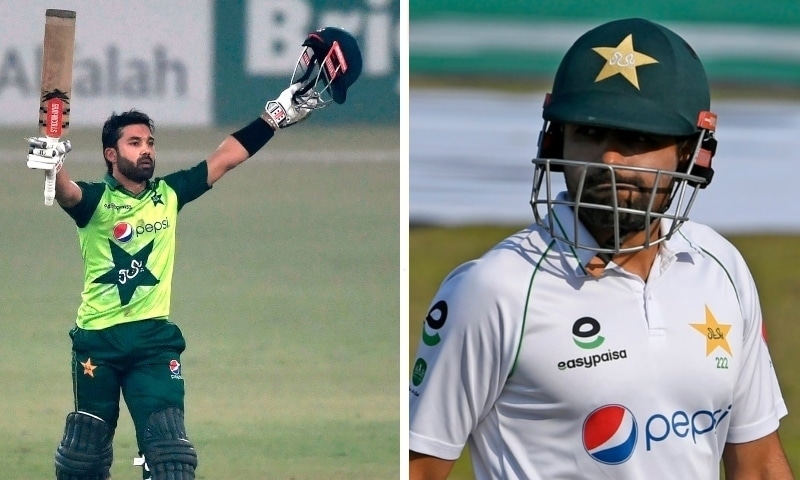WHAT is Pakistan’s strategy in 50-overs cricket? It’s a question that begged an answer when Pakistan went unchanged for a ‘dead’ rubber after two dismal defeats to England’s reserves. But the final ODI at Edgbaston turned out to be more about proving a point, and qualification points for the 50-overs World Cup in 2023, than laying the foundations for future success.
Pakistan were embarrassed in the first two ODI games at Cardiff and Lord’s, failing to score 200 in either innings. The performances revealed an inconvenient truth about the relative merits of the two combatants: England’s bench strength in 50 overs cricket is currently as deep as Pakistan’s is shallow. While Pakistan’s batting fortunes revolve around those of Babar Azam and Mohammad Rizwan, England can call up any number of fringe players and still dominate.
Between them, Babar and Rizwan, scored 70 percent of Pakistan’s runs at Edgbaston, and they did so in fine style and complete control. The pitch was a good one, and they pulled, drove, and dabbed with unerring consistency to reach a third-wicket stand of 179. It was a partnership that restored some of the team’s credibility, but the overall performance did little to quell doubts about the rest of the line up.
With India plus only the top seven ranked nations set to qualify for the 2023 ICC tournament, Pakistan need every win in the 50-overs format. That inevitably limits scope for experimentation but Pakistan must find a way. The openers are inconsistent, and the middle order didn’t deliver a substantial innings or late runs in England.
While the bowling seems strong on paper, only Shaheen Shah Afridi and Hasan Ali look like firm selections. Haris Rauf still has some way to go to convince that he is more than a T20 bowler, and Shadab Khan is yet to kick on with his international career as an allrounder. It’s hard to imagine that Faheem Ashraf’s medium pace is made for success in India.
The elephant in the room is the burden on Babar. Captaining and carrying the batting in three formats will take its toll. If the formula doesn’t dent his form and blunt his edge then Babar is a rare cricketer indeed. Although he heads the list in ICC’s ODI batting rankings, Babar has already slipped to joint 10th in the Test rankings. For Babar’s sake and for the sake of Pakistan cricket, the cricket board must relieve him of at least one of those captaincy responsibilities.
A similar issue, to a lesser extent, also besets Rizwan, who is being asked to keep in every game and play a prominent second fiddle to Babar’s first string batting. Here, the answer is even more straightforward with Sarfaraz Ahmed able to provide some rotation. If Babar and Rizwan end up being burnt out, what’s left?
There is much, then, for the Pakistan Cricket Board to address. And it didn’t learn much new from the England ODI series, other than that Saud Shakeel can anchor an innings and provide a handy option as a sixth bowler.
Whether Misbah-ul Haq and Waqar Younis are capable of solving these conundrums is far from clear? Misbah has a mixed record in ODIs at best, and the expected correlation between Waqar’s coaching stints and an uplift in Pakistan’s bowling performance hasn’t transpired.
In all these matters, Pakistan cricket is defaulting to its age old strategy: the cult of the hero. Find a good man, a hero, and give him the top job. Better still give him more than one top job; give him two, or even three. The rest will take care of itself, says the magical thinking.
Unfortunately, experience teaches us otherwise. The skills required to become a great player aren’t the skills required to become a great captain. And the skills required to become a great player or captain aren’t the same as those required to become a great coach. The outcome is usually a career destroyed or a reputation tarnished.
Only recently, Pakistan cricket placed too much burden on Sarfaraz. Now he barely earns selection. Misbah, meanwhile, was made chairman of selectors and coach in all formats without any experience in either role at international level. Perhaps he’ll be out of all these jobs by 2023?
For decades, the success of Pakistan cricket has depended too heavily on the qualities of a few good men, on the cult of the hero. The cult is floundering, and the PCB should seriously consider dividing captaincy and coaching responsibilities across all three formats because the holes in the individual strategies are too glaring and too persistent to be excused by a never ending process of ‘rebuilding’.
Otherwise, as things stand, Pakistan face a struggle to qualify for the 2023 World Cup in India, a failure that would be an unprecedented calamity.
Published in Dawn, July 15th, 2021















































